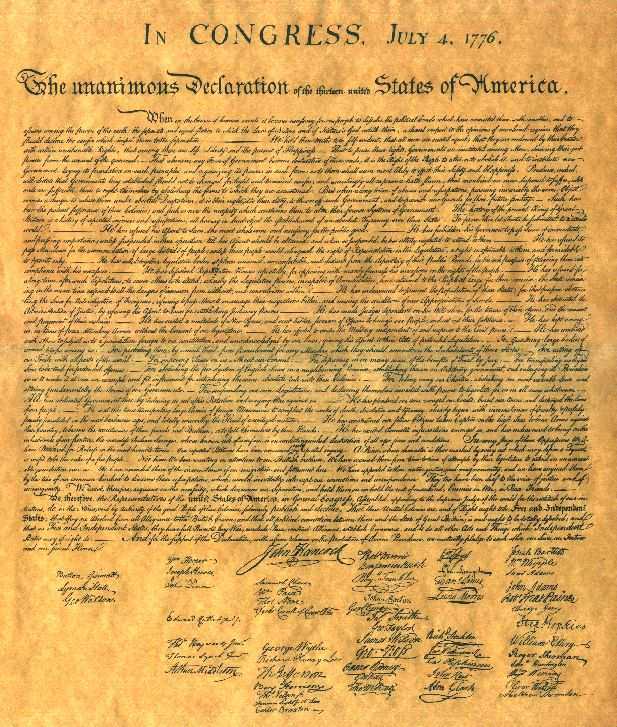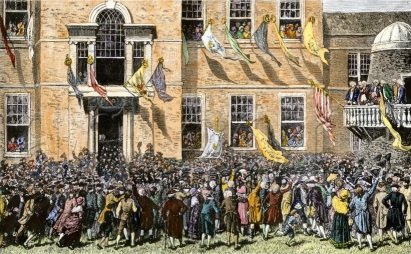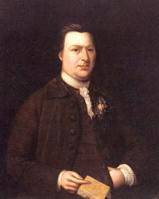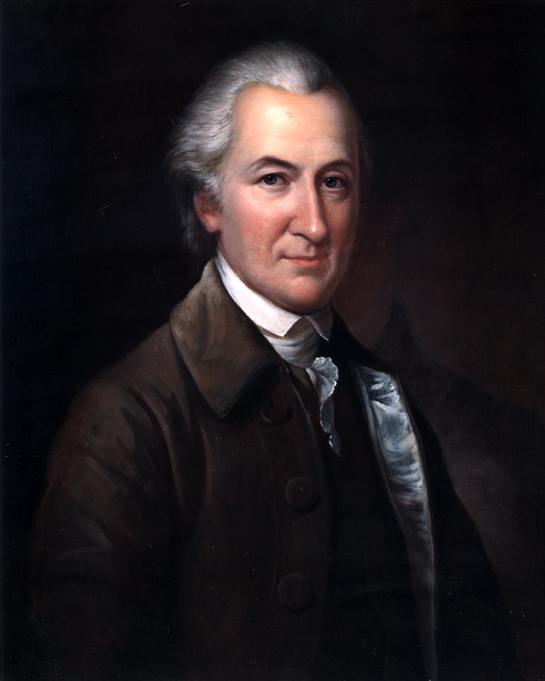The Declaration of Independence
The Declaration of Independence is one of the most important documents in human history and every citizen of the United States has the privilege of enjoying its benefits every day. Does that seem like a strong statement? The Declaration of Independence is one of the most prominent efforts by human beings to stand up in the face of tyranny and proclaim that every human being has God given rights to be free, to be protected and to pursue their lives the way they want to.
The Declaration was written by the rebelling Founding Fathers of the United States to declare their independence from the rule of Great Britain. Before its creation, most human beings lived under kings or dictatorships of one form or another. The men who signed the Declaration of Independence said, "Enough!" And changed the history of the world.
Did you know that you are a direct beneficiary of the Declaration of Independence? You may have never considered it, but the Founding Fathers of the United States have given you an opportunity that few people have ever had in human history and that is the opportunity to be free. The Founding Fathers did not want to live under the oppression of tyrannical dictators. They believed that God made each person to be free, to have his own conscience and to be free to make his own choices in life.
The English King and Parliament had put many unjust restrictions and laws on the American colonists, such as abolishing their local legislatures, forcing them to house soldiers on their own property, resisting the appointment of judges and other officials who disagreed with England, putting military authority in power over civilian authority, restricting their ability to trade with foreign countries, conducting sham trials of government officials accused of wrongdoing, levying taxes without their consent and a host of other issues.
The Founding Fathers tried for many years to get England to amend its ways and reason with them. Finally, when England wouldn't respond, the Americans decided that it was right to cast off the yoke of bondage the English were putting on them so they could live in freedom.
The American founders had very strong beliefs about the sanctity of human choice and human conscience, meaning that each person should have the choice to believe what he wants to and not be forced into anything against his will.
Today, we live in freedom because of the principles these Founders believed. We have freedom of speech, freedom of religion, freedom to choose our own leaders, freedom of the press, freedom to choose where we can work, who we marry, where we live and many, many other freedoms. We can follow our own dreams, instead of living for the will of the latest dictator.
If you have never read the Declaration of Independence before, you really should read it to get a basic understanding of American freedom and the reasons behind the Revolutionary War. You can read it at the bottom of this page. Don't be intimidated. It's not that long and you can understand it. Go for it. It will really help you in understanding the purpose and history of this great nation.
You can read the text of the Declaration here, then, when you are through, look over the rest of this page to learn more about its purpose, history and meaning.
The Purpose of the Declaration of Independence
What exactly was the purpose of the Declaration of Independence? Why was it even written at all?

The American Declaration of Independence was written to lay out in firm terms the purposes behind the American Revolution, so that anyone who was in doubt about whether or not it was justified would understand the reasoning that the "rebels" held.
There were four main purposes the Founding Fathers had when they created the Declaration. They intended to:
- Get reluctant colonists on board to create a unified home front against Great Britain
- Explain the colonists' position on the purpose of human government
- List their specific grievances against King George III to show the justification of their actions
- Encourage foreign nations to help them in their quest to overthrow British rule
You can learn more at our Purpose of the Declaration of Independence page here.
View a history of the Declaration of Independence in pictures.
Did you know the original Declaration of Independence can still be viewed in Washington D.C. today? In our Pictures of the Declaration of Independence section, you can view the original Declaration and see where it is housed in the Rotunda of the National Archives in Washington DC.
You can see Thomas Jefferson's handwritten drafts of the Declaration, as well as its first printing. We also have pictures of the Declaration's first public reading and the Continental Congress signing the Declaration of Independence.
You can see a copy of the Declaration of Independence that personally belonged to George Washington and copies of the most popular printings of the Declaration, such as the Goddard printing and the Stone Engraving.
View our pictures of the Declaration section here.
Signers of the Declaration of Independence
Who were the signers of the Declaration of Independence?
You have heard of some of the signers, such as Benjamin Franklin and Thomas Jefferson, but have you heard of Button Gwinnett of Georgia, who died in a duel before the war was even over, or Thomas Lynch from South Carolina, who left for France on a ship during the war and was never heard from again?
Meet the men who risked their lives and their fortunes for liberty. On the Founding Fathers page you will find a list of the signers of the Declaration of Independence separated by colony. You can read short biographies of many of them. More are in the works and will be added soon.
Go to the Founding Fathers page here.
Declaration of Independence Signatures
View the signatures of each signer of the Declaration of Independence. This is one of the most popular pages on our site due to its unique and interesting presentation of the signers' signatures.
The signatures are arranged in the order they appear on the Declaration by colony, along with a short description of each signer.
You will find many familiar names, such as Thomas Jefferson, Samuel Adams, John Hancock and John Adams, but you will also find the names of many others who are less well known, such as Charles Carroll of Maryland, the only Catholic signer of the Declaration of Independence, Thomas Heyward, Jr. of South Carolina, who was injured and captured at the Battle of Charleston and spent a year in a British prison camp and Carter Braxton of Virginia, a wealthy shipping merchant before the war, whose fleet of ships was captured by the British, destroying his wealth and causing him to die in poverty.
Go to our Declaration of Independence Signatures page here!
Thomas Jefferson and the Declaration of Independence
Thomas Jefferson, a red-headed Virginia lawyer, was the author of the Declaration of Independence.
Read the fascinating story of how he created it and how his thinking came to be what it was.
You will learn about the Graff House, where Thomas Jefferson actually wrote the Declaration of Independence. You can see the actual writing desk and the pen that he used to write it as well.
Jefferson was appointed to a committee to write the Declaration which came to be known as the "Committee of Five." It was made up of Jefferson, Benjamin Franklin, John Adams, Robert Livingston and Robert Sherman.
Jefferson had written a document that was published by the Virginia Convention called A Summary View of the Rights of British America, which detailed British abuses and laid out the legal rights of Americans. This document was widely read and was viewed very favorably by the Continental Congress.
In addition, Jefferson wrote a draft for a new Constitution for the state of Virginia that was also viewed favorably. The writing of these two documents led to his being chosen by the Committee of Five to write the Declaration.
At our page about Thomas Jefferson and the Declaration of Independence, you will find Jefferson's original draft of the Declaration, which was amended by the Committee and later amended again by Congress. You will also find many pictures, such as a fragment of Jefferson's original draft.
Read about Thomas Jefferson and the Declaration of Independence here.
The Olive Branch Petition
Did you know that many American patriots did not want to break away from Great Britain? After all, they were British citizens. They and their families were immersed in British customs and traditions and they loved their heritage. They tried diligently to avoid conflict with their mother country. Over and over again they tried to get the British King and Parliament to address their complaints, but they never succeeded. Declaring independence was their last resort.
In July 1775, Congress made its last attempt at peace with Britain. It came to be known as the Olive Branch Petition and its primary author was John Dickinson of Pennsylvania. Some Americans hoped that King George and Parliament were merely misunderstanding their frustrations and complaints, rather than deliberately imposing unjust and illegal policies upon them. The Olive Branch Petition was a last effort to persuade King George that the acts of Parliament restricting the colonies were indeed unjust.
Of course we all know this last effort at peace ultimately failed. Find out why and learn more about the Olive Branch Petition here.
The History of the Declaration of Independence
This is a lengthy article by the National Archives about the History of the Declaration of Independence. It covers the call for the Declaration in June 1776 and follows its creation by Jefferson and the Committee of Five.
After its creation, the article follows the Declaration as it traveled with Congress during the war, through its many homes in Washington DC over the years to its storage at Fort Knox for protection during World War II. The article also talks about efforts to preserve the Declaration of Independence over the years to the creation of its current resting place in the Rotunda of the National Archives in Washington DC.
Read this fascinating article about the History of the Declaration here.
Contents of the Declaration of Independence
What exactly is in the Declaration of Independence? What subject matter does it cover? The Declaration can be easily broken into six different parts. They are as follows:
- The first part is the Declaration of Independence Preamble. This part is familiar to many people. It states that the reason the colonists wrote the Declaration was to tell the world why they were separating from Britain. It goes like this: "When in the Course of human events, it becomes necessary for one people to dissolve the political bands which have connected them with another, and to assume among the powers of the earth, the separate and equal station to which the Laws of Nature and of Nature's God entitle them, a decent respect to the opinions of mankind requires that they should declare the causes which impel them to the separation."
- The second part could be called a "statement of belief." It tells the beliefs of the colonists about human rights and the purpose of government. It begins with the familiar phrase: "We hold these truths to be self-evident, that all men are created equal, that they are endowed by their Creator with certain unalienable rights, that among these are Life, Liberty and the pursuit of Happiness."
- The third section lists all of the specific complaints the colonists had about the King's conduct. This is one of the most important parts of the Declaration because it tells exactly what the colonists were angry about. Read this section to get a good understanding of the causes behind the Revolutionary War.
- The fourth section recounts the colonists past attempts to get the King to redress their grievances.
- The fifth section is the actual declaration of independence from Great Britain: "We, therefore, the Representatives of the united States of America... declare, That these United Colonies are, and of Right ought to be Free and Independent States; that they are Absolved from all Allegiance to the British Crown, and that all political connection between them and the State of Great Britain, is and ought to be totally dissolved."
- The sixth and final section is the signatures. Take a look at one of the most popular pages on our site, our Signatures on the Declaration page here.
Copy of the Declaration of Independence
IN CONGRESS, July 4, 1776.
The unanimous Declaration of the thirteen united States of America,
When in the Course of human events, it becomes necessary for one people to dissolve the political bands which have connected them with another, and to assume among the powers of the earth, the separate and equal station to which the Laws of Nature and of Nature's God entitle them, a decent respect to the opinions of mankind requires that they should declare the causes which impel them to the separation.
We hold these truths to be self-evident, that all men are created equal, that they are endowed by their Creator with certain unalienable Rights, that among these are Life, Liberty and the pursuit of Happiness.--That to secure these rights, Governments are instituted among Men, deriving their just powers from the consent of the governed, --That whenever any Form of Government becomes destructive of these ends, it is the Right of the People to alter or to abolish it, and to institute new Government, laying its foundation on such principles and organizing its powers in such form, as to them shall seem most likely to effect their Safety and Happiness. Prudence, indeed, will dictate that Governments long established should not be changed for light and transient causes; and accordingly all experience hath shewn, that mankind are more disposed to suffer, while evils are sufferable, than to right themselves by abolishing the forms to which they are accustomed. But when a long train of abuses and usurpations, pursuing invariably the same Object evinces a design to reduce them under absolute Despotism, it is their right, it is their duty, to throw off such Government, and to provide new Guards for their future security.--Such has been the patient sufferance of these Colonies; and such is now the necessity which constrains them to alter their former Systems of Government. The history of the present King of Great Britain is a history of repeated injuries and usurpations, all having in direct object the establishment of an absolute Tyranny over these States. To prove this, let Facts be submitted to a candid world.
He has refused his Assent to Laws, the most wholesome and necessary for the public good.
He has forbidden his Governors to pass Laws of immediate and pressing importance, unless suspended in their operation till his Assent should be obtained; and when so suspended, he has utterly neglected to attend to them.
He has refused to pass other Laws for the accommodation of large districts of people, unless those people would relinquish the right of Representation in the Legislature, a right inestimable to them and formidable to tyrants only.
He has called together legislative bodies at places unusual, uncomfortable, and distant from the depository of their public Records, for the sole purpose of fatiguing them into compliance with his measures.
He has dissolved Representative Houses repeatedly, for opposing with manly firmness his invasions on the rights of the people.
He has refused for a long time, after such dissolutions, to cause others to be elected; whereby the Legislative powers, incapable of Annihilation, have returned to the People at large for their exercise; the State remaining in the mean time exposed to all the dangers of invasion from without, and convulsions within.
He has endeavoured to prevent the population of these States; for that purpose obstructing the Laws for Naturalization of Foreigners; refusing to pass others to encourage their migrations hither, and raising the conditions of new Appropriations of Lands.
He has obstructed the Administration of Justice, by refusing his Assent to Laws for establishing Judiciary powers.
He has made Judges dependent on his Will alone, for the tenure of their offices, and the amount and payment of their salaries.
He has erected a multitude of New Offices, and sent hither swarms of Officers to harrass our people, and eat out their substance.
He has kept among us, in times of peace, Standing Armies without the Consent of our legislatures.
He has affected to render the Military independent of and superior to the Civil power.
He has combined with others to subject us to a jurisdiction foreign to our constitution, and unacknowledged by our laws; giving his Assent to their Acts of pretended Legislation:
For Quartering large bodies of armed troops among us:
For protecting them, by a mock Trial, from punishment for any Murders which they should commit on the Inhabitants of these States:
For cutting off our Trade with all parts of the world:
For imposing Taxes on us without our Consent:
For depriving us in many cases, of the benefits of Trial by Jury:
For transporting us beyond Seas to be tried for pretended offences
For abolishing the free System of English Laws in a neighbouring Province, establishing therein an Arbitrary government, and enlarging its Boundaries so as to render it at once an example and fit instrument for introducing the same absolute rule into these Colonies:
For taking away our Charters, abolishing our most valuable Laws, and altering fundamentally the Forms of our Governments:
For suspending our own Legislatures, and declaring themselves invested with power to legislate for us in all cases whatsoever.
He has abdicated Government here, by declaring us out of his Protection and waging War against us.
He has plundered our seas, ravaged our Coasts, burnt our towns, and destroyed the lives of our people.
He is at this time transporting large Armies of foreign Mercenaries to compleat the works of death, desolation and tyranny, already begun with circumstances of Cruelty & perfidy scarcely paralleled in the most barbarous ages, and totally unworthy the Head of a civilized nation.
He has constrained our fellow Citizens taken Captive on the high Seas to bear Arms against their Country, to become the executioners of their friends and Brethren, or to fall themselves by their Hands.
He has excited domestic insurrections amongst us, and has endeavoured to bring on the inhabitants of our frontiers, the merciless Indian Savages, whose known rule of warfare, is an undistinguished destruction of all ages, sexes and conditions.
In every stage of these Oppressions We have Petitioned for Redress in the most humble terms: Our repeated Petitions have been answered only by repeated injury. A Prince whose character is thus marked by every act which may define a Tyrant, is unfit to be the ruler of a free people.
Nor have We been wanting in attentions to our British brethren. We have warned them from time to time of attempts by their legislature to extend an unwarrantable jurisdiction over us. We have reminded them of the circumstances of our emigration and settlement here. We have appealed to their native justice and magnanimity, and we have conjured them by the ties of our common kindred to disavow these usurpations, which, would inevitably interrupt our connections and correspondence. They too have been deaf to the voice of justice and of consanguinity. We must, therefore, acquiesce in the necessity, which denounces our Separation, and hold them, as we hold the rest of mankind, Enemies in War, in Peace Friends.
We, therefore, the Representatives of the united States of America, in General Congress, Assembled, appealing to the Supreme Judge of the world for the rectitude of our intentions, do, in the Name, and by Authority of the good People of these Colonies, solemnly publish and declare, That these United Colonies are, and of Right ought to be Free and Independent States; that they are Absolved from all Allegiance to the British Crown, and that all political connection between them and the State of Great Britain, is and ought to be totally dissolved; and that as Free and Independent States, they have full Power to levy War, conclude Peace, contract Alliances, establish Commerce, and to do all other Acts and Things which Independent States may of right do. And for the support of this Declaration, with a firm reliance on the protection of divine Providence, we mutually pledge to each other our Lives, our Fortunes and our sacred Honor.
John Hancock
|
Button Gwinnett Lyman Hall George Walton |
William Hooper Joseph Hewes John Penn Edward Rutledge Thomas Heyward, Jr. Thomas Lynch, Jr. Arthur Middleton |
Samuel Chase William Paca Thomas Stone Charles Carroll of Carrollton George Wythe Richard Henry Lee Thomas Jefferson Benjamin Harrison Thomas Nelson, Jr. Francis Lightfoot Lee Carter Braxton |
Robert Morris Benjamin Rush Benjamin Franklin John Morton James Smith George Taylor James Wilson George Ross Caesar Rodney George Read Thomas McKean |
William Floyd Philip Livingston Francis Lewis Lewis Morris Richard Stockton John Witherspoon Francis Hopkinson John Hart Abraham Clark |
Josiah Bartlett William Whipple Samuel Adams Robert Treat Paine Elbridge Gerry Stephen Hopkins William Ellery Roger Sherman Samuel Huntington William Williams Oliver Wolcott Matthew Thornton |
Last updated 8/20/12
Now that you've read about the Declaration, test your knowledge with our Declaration of Independence Signers Crossword Puzzle.
- Learn about Thomas Jefferson and the Declaration of Independence here
- Look at the Declaration of Independence in pictures
- Learn more about the Purpose of the Declaration of Independence here
- View all of the Signatures on the Declaration of Independence
- Read about the History of the Declaration here
- Learn more about the Founding Fathers of America here
Return to top of Declaration of Independence
Revolutionary War and Beyond Home
Like This Page?
© 2008 - 2022 Revolutionary-War-and-Beyond.com Dan & Jax Bubis



















Facebook Comments